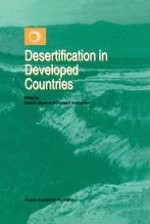1995 | OriginalPaper | Buchkapitel
Implications of the Disintegration of the Former Soviet Union for Desertification Control
verfasst von : T. A. Saiko
Erschienen in: Desertification in Developed Countries
Verlag: Springer Netherlands
Enthalten in: Professional Book Archive
Aktivieren Sie unsere intelligente Suche, um passende Fachinhalte oder Patente zu finden.
Wählen Sie Textabschnitte aus um mit Künstlicher Intelligenz passenden Patente zu finden. powered by
Markieren Sie Textabschnitte, um KI-gestützt weitere passende Inhalte zu finden. powered by
Following the removal of censorship on environmental information in 1986 the magnitude of the Aral Sea disaster has been publicly acknowledged while the situation has continually worsened. Major efforts by the USSR Academy of Sciences as well as republic scientists since the 1970s have been supplemented by international expertise. The Soviet government adopted a special resolution on the Aral Sea in September 1988, but adequate financing was not available to solve this problem. With the disintegration of the USSR, the new independent states took full responsibility for their desertification control. In a corresponding tide of nationalism, Russia was solely accused of being responsible for the problem, and, not surprisingly, the controversial project of Siberian river diversion has been recently revived. There has been a transition from Russian to state language in all institutions, thus “squeezing out” the speaking of Russian. The Central Asian states have started to explore their own ways to deal with the catastrophe. But political, cultural, and ethnic rivalries between countries; growing nationalism and economic difficulties; and competition for water have not created the conditions to successfully solve desertification problems. Without change, the future of the Aral Sea appears to be bleak.
